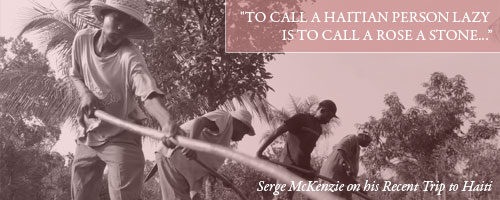
Three months after the earthquake in Haiti, phlebotomist Serge McKenzie of New Hartford, NY accompanied his father priest Daniel McKenzie the administrator of the ROCOR mission in Haiti on a trip to the country in order to visit the ROCOR mission in Haiti. The Fund for Assistance to ROCOR asked Mr. McKenzie to relive his experience in Haiti.
 Serge McKenzie: It was my first time in Haiti. The only thing I knew about it before was what I saw on the news. In this case the information was very wrong, the situation is much worse than I could�ve ever imagined and yet the people have such a positive outlook. Serge McKenzie: It was my first time in Haiti. The only thing I knew about it before was what I saw on the news. In this case the information was very wrong, the situation is much worse than I could�ve ever imagined and yet the people have such a positive outlook.
They seem to be extremely optimistic about the future, aggressive about getting their work done, about making just $1 so they can eat. They are extremely positive. It seems like the whole nation does have faith in God, and now they have accepted the situation � you know there are still bodies under the rubble, they don�t smell anymore, they�ve accepted this, they are taking it day by day with a smile.
FFA: What struck you particularly?
SM: Most people don�t have a home, or their house is leaning to the side or has a large crack in it. People are not living in it because of the fear of it coming down. The most fortunate ones are those who have a tent from the UN or just tarp. Some put up sticks and four sheets. Others people have nothing.
Everyone�s on the street, everyone�s trying to sell something so they can eat something tonight. Some are selling crafts, some - charcoal, one man was trying to sell ice.
FFA: How do they survive?
SM: Several years ago I used to work for American Airlines as a flight-attendant and I used to do the Haiti flight. People would put live chickens into their bags� things that are too common for us to want to smuggle into another country because you could just buy them there. I never understood why someone would risk being kicked off a flight for sneaking food or small animals to your country. Ten years later, I come back to Haiti and I realize that if you bring a chicken, the chicken will lay eggs, which you can eat for breakfast. You can buy a chicken in Haiti, but it will cost you money you might need for something else.
FFA: What did you think of the Haitian people?
SM: One person who worked with me at American Airlines told me once: �Haitian people are lazy,� and I agreed because I didn�t know anything about them. Ten year later, I realized that to call a Haitian person lazy is to call a rose a stone.
If I saw someone in Haiti who wasn�t doing anything, he was either incapacitated and immobile, or a drug addict.
Compared with what I saw, we live like kings here in the U.S. I have a one bedroom apartment for myself. In Haiti they would have 15-16 people living there. I have grapes in my fruit bowl, I am going to eat salmon for dinner and then take a hot shower. The Haitians don�t have these things. You see people showering in the streets. They buy a pint-size plastic bag, drink half of it and pour the rest over their heads. Or they spray themselves from a hose.
Appearance is not what is vital to them, cleanliness is. Being clean, having a clean shirt on is very important to them. In these difficult circumstances, none of them smell bad, they clean themselves often. It�s interesting because some people here in the U.S. are the opposite despite having the means.
FFA: Would you ever go back to Haiti?
SM: I hope I can go back soon. I didn�t want to leave because I�ve never been surrounded by so many optimists. These people are wonderful. They mission: the priests, the matushkas, the parishioners are moving forward. They regrouped after the disaster and set a plan of action. Our mission is different: it is to make that plan happen because they can�t do it alone. Some people think they cannot afford to give. If you pay $200 a month to watch HBO, we can give the mission in Haiti $100. If it�s too much get four people to contribute $25. That will feed a family in Haiti. Small changes that need to be made for monumental results.
Please support the Church's work in Haiti
Donate by PayPal or Credit Card
or
Send a check or Money Order to
The Fund for Assistance to the Russian Orthodox Church Outside of Russia (for Haiti)
75 E 93 St
New York, NY
10128
fundforassistance.org
|